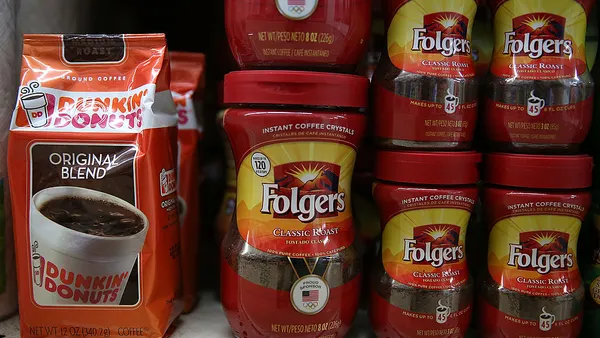Dive Brief:
- Metals buyers are feeling the pinch of increased steel prices, thanks to recent U.S. tariff announcements. Last week, the nation's largest nail manufacturer was said to be on the "brink of extinction" as it laid off 60 workers due to increased steel costs, according to CNN.
- Even though Steelcase, a furniture company, does not "expect to have to pay much for the tariff amounts" since the company buys mostly from U.S. metal suppliers, "the tariffs have been a larger trigger for inflation," CEO James Keane said in an earnings call.
- In fact, the company is forecasting a $5 million rise in cost of goods sold from the increase in steel prices. "That's just steel," he said. Fuel and freight costs are also rising, further thinning margins.
Dive Insight:
Steelcase is relatively lucky: it has a supply chain that sources primarily from the U.S., and President Trump has granted an exclusion for the links that do not — PolyVision, a Steelcase company, was "one of only 42 exemptions granted in this first wave," according to Keane.
Even so, the company has seen price hikes on steel since the beginning of the year.
"Just to give you a sense of the impact, the cost of coal rolled steel in the U.S. has risen over 20% since January 1st and because the price is rising in the U.S. it's causing increases in other parts of the world as well that took over market place after all," Keane said.
Tariff announcements from the U.S. have roiled global markets during the first half of 2018. In March, President Trump announced a 25% tax on various categories of foreign steel and aluminum. He then excluded major import partners for the products, like Brazil and South Korea, but did not spare NAFTA neighbors, the EU or China — also top sources of steel and aluminum — from the price increases.
The tariffs against China, at least, officially enter force on July 6, and markets have responded.
The prices increases, however, are good for U.S. metals suppliers and have yet to affect the availability of supply, Barbara Smith, President and CEO of Commercial Metals Company, told investors in an earnings call.
"We are very pleased with the action taken by President Trump on the Section 232 trade measures to reduce the threat of subsidized and unfairly priced [steel] imports," Smith said.
The tariffs affect different categories of metals differently, however.
"232 is really not impacting fab (fabricated metals) the same way that is impacting the mills," Smith said. But "there have been significant raw material price increases that we've seen that is a significant driver to rebar prices."
In other words, while steel mills may be seeing more direct effects, fabricators are suffering from the same indirect effects of tariffs other metals buyers (such as Steelcase) are. Selling prices typically lag increases in raw materials prices, Commercial Metals CFO Mary Lindsey explained to investors.
"All fabricators are competing for work just as they have historically," Smith said. However, when asked if she had seen market share gains due to the import constraints, she could not affirm a "significant shift there" at this time.














